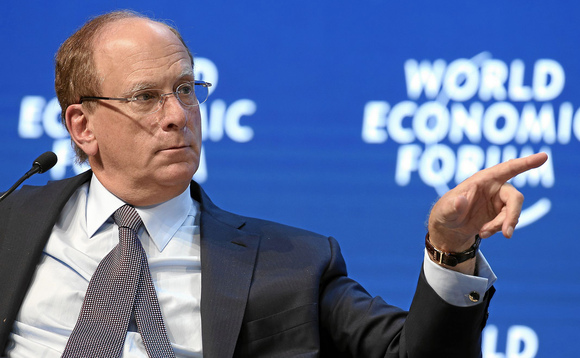In his annual letter, CEO Larry Fink stressed the importance of oil and gas in meeting global energy demands, as he promised to offer clients the choice of investing in clean energy
The world's largest asset manager has signalled it will continue to work with fossil fuel companies which are "essential in meeting society's energy needs", BlackRock's chief executive Larry Fink has said as he this week defended the investment giant's approach to the energy transition.
In his annual letter addressed to all stakeholders, Fink dedicated a portion of his yearly address to the low carbon energy transition and energy crisis, arguing that the topic is "top of mind for many of our clients".
"Transition toward lower carbon emissions will reflect the regulatory and legislative choices governments make to balance the need for secure, reliable and affordable energy with orderly decarbonisation," he said. "We know that the transition will not be a straight line."
Fink stated that different countries and industries will move at "different speeds", and oil and gas will continue to play a "vital role" in meeting global energy demands.
He added that many of BlackRock's clients view this transition as an investment opportunity, which will come as established energy companies look to adapt their business models.
"They recognise the vital role energy companies will play in ensuring energy security and a successful energy transition," he added.
Fink confirmed that BlackRock would continue to work with "energy companies globally which are essential in meeting societies' energy needs".
But despite growing calls from campaigners and some investors for BlackRock to divest from fossil fuel firms, Fink stressed that BlackRock would be working with fossil fuel companies such as those in natural gas sector, provided that they take steps to mitigate their methane emissions.
As an example, he explained how BlackRock is currently working on investments on behalf of its clients in "responsibly-managed" natural gas pipelines, such as in the Middle East where it has invested in a pipelines which he said would help the region use less carbon intensive oil for power production.
BlackRock's defence of its continued investment in fossil fuel assets drew a predictably critical response from campaigners.
Reclaim Finance's Lucie Pinson said that Fink "cannot have his cake and eat it", stressing that BlackRock should be taking a stronger stance against investing in the development of new oil and gas projects, including the development of Liquified Natural Gas (LNG) facilities.
"Even worse, by depicting gas as a bridging fuel that must be supported, Fink misrepresents the facts and fails to provide his clients with the information they need to identify their long term interests," she warned. "As the IEA has made clear, there is no room in a 1.5C scenario for LNG and we need to stop opening new fields in order to reduce gas production by 23 per cent by 2030. Mr Fink must tailor his investments accordingly."
While Fink did not specifically mention environmental, social, and governance (ESG) issues in his letter, he dedicated a large portion to how the energy transition is likely to affect the economy, asset prices, and investment performance and re-iterated that BlackRock views climate risk as an investment risk.
Fink highlighted the recent global impacts of climate change, including wildfires in California and flooding in Pakistan, stating that the world of finance is "not immune" to climate change, with the most immediate effects being felt in the insurance sector.
According to Munich Re, insurers had to pay out $120bn last year for climate-led disasters, which Fink said was "a once unthinkable figure".
Climate risks could in turn have a knock-on effect for the housing market, where people may begin to relocate to areas less affected by extreme weather, he warned.
Overall, Fink said that BlackRock's clients have a range of investment objectives and perspectives, including clients who want to invest in ways which accelerate the transition to a clean energy system, as well as clients who choose not to.
He argued that as an asset manager it is BlackRock's role to "offer choice to help clients reach their investment goals" and to manage their assets with their goals in mind. He did not indicate that it was their role as asset managers to persuade clients to invest in the transition to a clean energy transition if they had not chosen to.
He stressed that BlackRock's approach to investing in the clean energy transition is the same as its approach across its platform, stating that it provides choice to its clients, finds the best risk-adjusted returns within the mandate the client gives them, and then underpins this with research, data and analytics.
Alexandra Mihailescu Cichon, executive vice president at ESG data science firm RepRisk, argued that ESG risks were clearly being factored in to BlackRock's approach. "Despite not mentioning ESG explicitly in BlackRock's nearly 10,000-word Annual Chairman's Letter to Investors, it is implicitly woven throughout," she said. "From what we read, similar to BlackRock's Investment Stewardship policies for 2023, the underlying strategy and approach has not changed - even if some of the language has. This is a message to all stakeholders that sustainability risk and double materiality remain key pillars for both investing and doing business with the viability of the economy, people, and the planet in mind."
Fink also highlighted how changes to government policy, technology, and consumer preferences would all create "significant investment opportunities".
BlackRock's clients have increasingly requested data on how a changing climate and energy transition could affect their portfolios in the long-term, he said.
However, he also argued that "it is not the role of an asset manager like BlackRock to engineer a particular outcome in the economy, and we don't know the ultimate path and timing of the transition".
This is why BlackRock has been "so vocal" in recent years in asking companies to disclose their emissions and publish their plans on how they plan to navigate the energy transition, he explained, while acknowledging that "better data is essential".
Fink said more than half of the companies in the S&P 500 now voluntarily report their Scope 1 and Scope 2 emissions, a figure which he expects will continue to rise. "But as I have said consistently over many years now, it is for governments to make policy and enact legislation, and not for companies, including asset managers, to be the environmental police," he stressed.
Fink acknowledged the role that governments are already having in the green energy transition and how it is impacting financial markets. He cited that Inflation Reduction Act in the US as "creating significant opportunities for investors" to invest in the energy transition with this legislation already committing an estimated $369bn for investment in energy security and climate change mitigation.
Fink noted that the legislation is already helping to attract investment into existing and emerging technologies such as carbon capture and green hydrogen and added that BlackRock is looking to create more opportunities for its clients to be involved in some of the green infrastructure and energy projects that have been unleashed.
"Some of the most attractive investment opportunities in the years ahead will be in the transition finance space," he said.
"Given its importance to our clients, BlackRock's ambition is to be the leading investor in these opportunities on their behalf. For clients who choose, we're connecting them with these investment opportunities."
Jessye Waxman, senior campaign representative from environmental campaign group Sierra Club, pushed back against Fink's central argumennts that asset managers should offer clients choice to respond to the climate emergency.
"Climate change is the single biggest long-term threat to financial markets, with impacts already felt across the economy," she said. "Fiduciary duty is about prioritising clients' best interests, which requires responsible and proactive management of risk. BlackRock is leaning into offering clients choice, but deference to choice can't be a shield for abdication of responsible risk management."







